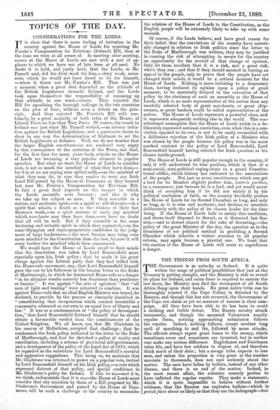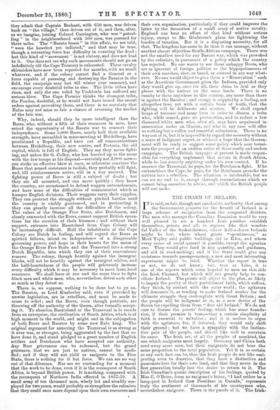THE TIDINGS FROM SOUTH 4FRICA. T HE Government is as unlucky
as Ireland. It i quite- within the range of political possibilities that just as the Treasury is getting straight, and the Ministry is able to reveal' its plans for Ireland, and extra force is required to sustain the law there, the Ministry may find the reconquest of all South Africa flung upon their hands. No great native tribe can be- thoroughly trusted if the Cape Colony is defeated by the Basutos, and though this has not occurred, the Government of the Cape can claim as yet no measure of success in their cam- paign. All they have been able to do has been to avoid a striking and visible defeat. The Basuto cavalry attack incessantly, and though the mounted Volunteers usually repulse them, nothing approaching submission follows the repulse. Indeed, nothing follows, except another long spell of marching to and fro, followed by more attacks Theofficials always report great losses to the enemy, which sometimes occur and sometimes are invented, but in neither case make any serious difference. Englishmen and Dutchmen value life, and have few soldiers to dispose of, and therefore think much of their slain ; but a savage tribe expects to lose men, and unless the proportion is very great or the number amounts to thousands, does not care seriously about the matter. The men have fallen by bullets, instead of any other disease, and there is an end of the matter. Indeed, in the most recent affair, the colonists scarcely profess to have inflicted the regular repulse. They make a statement, which it is quite impossible to believe without further evidence, that the Basutos use explosive bullets—which is primd facie about as likely as that they use the heliograph—but
they admit that Captain Brabant, with 650 men, was driven back on "the village," then driven out of it, and then, after, as we imagine, joining Colonel Carrington, who was " patrol- ling " in the neighbourhood with 500 men, was pursued for three miles. The "Basuto losses" in this affair, we are told, "were the heaviest yet inflicted," and that may be true, though a retreating force has difficulty in counting the dead ; but this kind of " movement " is not victory, and does not lead to it. One does not see why such movements should not go on indefinitely till the Cape Treasury is exhausted. These cavalry skirmishes have now been reported for months, with no result whatever, and if the colony cannot find a General or a force capable of pursuing and destroying the Basutos in the field, the campaign may last till winter (our summer), and encourage every doubtful tribe to rise. The little tribes have risen, and only the one ruled by Umhlonlo has suffered any serious blow. The Cape Premier thinks the strongest tribe, the Pondos, doubtful, or he would not have issued the recent orders against provoking them, and there is no certainty that Zulus may not seize so fair a chance of reversing the verdict of the late war.
Why, indeed, should they be more intelligent than the Boers, who, without a fifth of their resources in men, have seized the opportunity of the Basuto war to reassert their independence. Some 5,000 Boers, nearly half their available strength, have assembled in mass-meeting at Heidelberg, have proclaimed a Republic, and have cut off communications between Heidelberg, their new centre, and Pretoria, the old capital, which is full of English. They say they mean fight- ing, and unless Sir G. Colley, who has hurried up to the scene with the few troops at his disposal—certainly not 2,000 men— can strike an effective blow at once, or otherwise convince the Boers that armed resistance is foolish, they probably will fight, and, till reinforcements arrive, will in a way succeed. The fighting power of Boers is still a subject of doubt ; but they are all mounted, and can move quickly ; they know the country, are accustomed to defend waggon entrenchments, and have none of the difficulties of commissariat which so hamper English divisions. Their waggons carry their supplies. They can protract the struggle without pitched battles until the country is visibly garrisoned, and in protracting it they can greatly increase all the difficulties of the colony. The rulers of the Orange Free State, also Dutchmen, and closely connected with the Boers, cannot support British opera- tions for the coercion of their kinsmen ; and without their support, entrance into Basutolaud from Cape Colony will be increasingly difficult. Half the inhabitants of the Cape Colony are Dutch in feeling, and will regard the Boers as spirited fellows, intent on independence of a disagreeable governing power, and hope in their hearts for the union of the Orange River Free State and the Transvaal into a strong Dutch Republic, into which they can at their convenience remove. The colony, though heartily against the insurgent blacks, will not be heartily against the insurgent whites, and the half-heartedness of the people will grievously increase every difficulty which it may be necessary to meet from local resources. We shall have at one and the same time to fight black men and white men, who, nevertheless, detest each other as much as they detest us.
There is, we suppose, nothing to be done but to go on. The Basutos, as Lord Kimberley said, even if provoked by unwise legislation, are in rebellion, and must be made to cease to rebel ; and the Boers, even though patriotic, are throwing off the authority of the Queen, after formally accept- ing it. To abandon Basutoland or the Transvaal is to recede from an enterprise, the civilisation of South Africa, which is of high moment to the world, and might end in the subjugation of both Boers and Basutos by some new Zulu king. The original argument for annexing the Transvaal is as strong as it ever was, or stronger, being aggravated by the fact that we have done it, and stand pledged to a great number of English settlers and Dutchmen who have accepted our authority. Any Boer grievances can be redressed, but the grand grievance, that we are just to natives, cannot be modi- fied; and if they will not yield or emigrate to the Free State, there is nothing for it but force. We can see no way out of that dilemma. Nor are we contending for a moment that the work to be done, even if it is the reconquest of South Africa, is beyond British power. It is nothing, compared with the reconquest of Northern India effected in 1857-59. A small army of ten thousand men, wisely led and steadily em- ployed for two years, would probably so strengthen the colonists that they could once more depend upon their own resources and their own organisation, particularly if they could improve the latter by the formation of a small army of native cavalry. England can bear an effort of that kind without serious injury, except to Mr. Gladstone's plans for lightening the burden of taxation. But it is a disgusting necessity, for all that. The kingdom has more to do than it can manage, without another almost objectless South-African campaign. There was not the smallest need for any Basuto war, which was provoked by the colonists, in pursuance of a policy which the country has rejected. No one wants to see these unhappy Boers, who are as ignorant of foreign politics as the hippopotamuses of their own marshes, shot., or taxed, or coerced in any way what- ever. No one would object to give them a " Reservation " such as the American Government gives the Indians, provided only they would give up, once for all, their claim to deal as they please with the natives on the same lands. There is no enmity to them anywhere in this country, any more than there is against the Basutos ; and energy is crippled by a feeling, not altogether true, yet with a certain basis of truth, that the fighting will be deliberate and wanton. We shall expend heaps of treasure and many lives in order to disarm a tribe who, while armed, gave no provocation, and to reduce a few thousand white men who, after all, may have acquiesced in annexation under an illusion, and who in any case will offer us nothing but a sullen and resentful submission. There is no way out of it, but it is impossible to regard the necessity without a sense of indignant regret, or without a hope that the Govern- ment will be ready to suggest some policy which may termi- nate the prospect of an endless series of these costly and useless campaigns. The British taxpayer at present is made respon- sible for everything unpleasant that occurs in South Africa, while he has scarcely anything under his own control. If he annexes the Transvaal, he pays, for the Dutchmen fight. If he enfranchises the Cape, he pays, for the Dutchmen provoke the natives into a rebellion. The situation is intolerable but we
can see no end to it, except through renunciations intolerable, we
cannot bring ourselves to advise, and which the British people will not make.



































 Previous page
Previous page